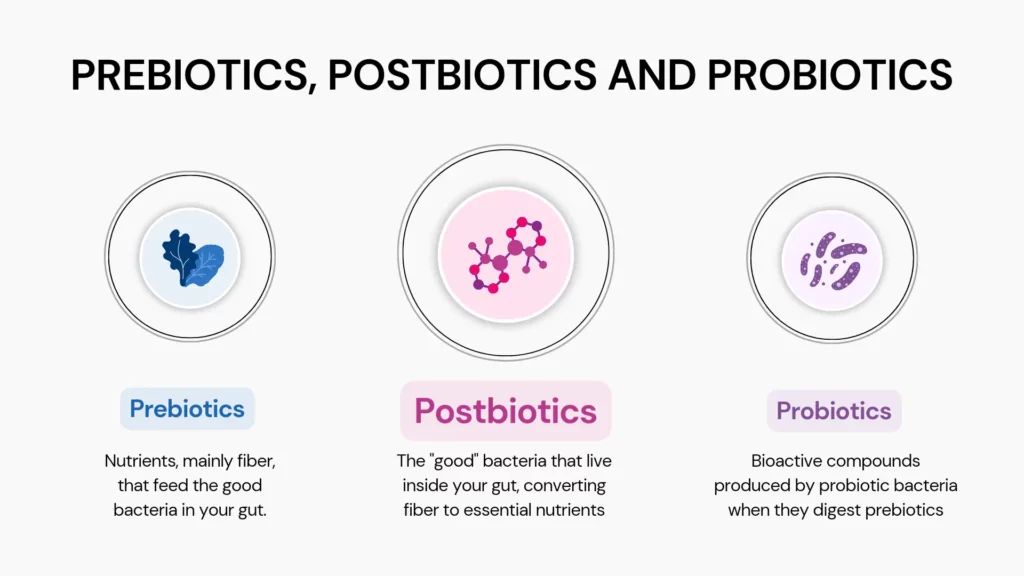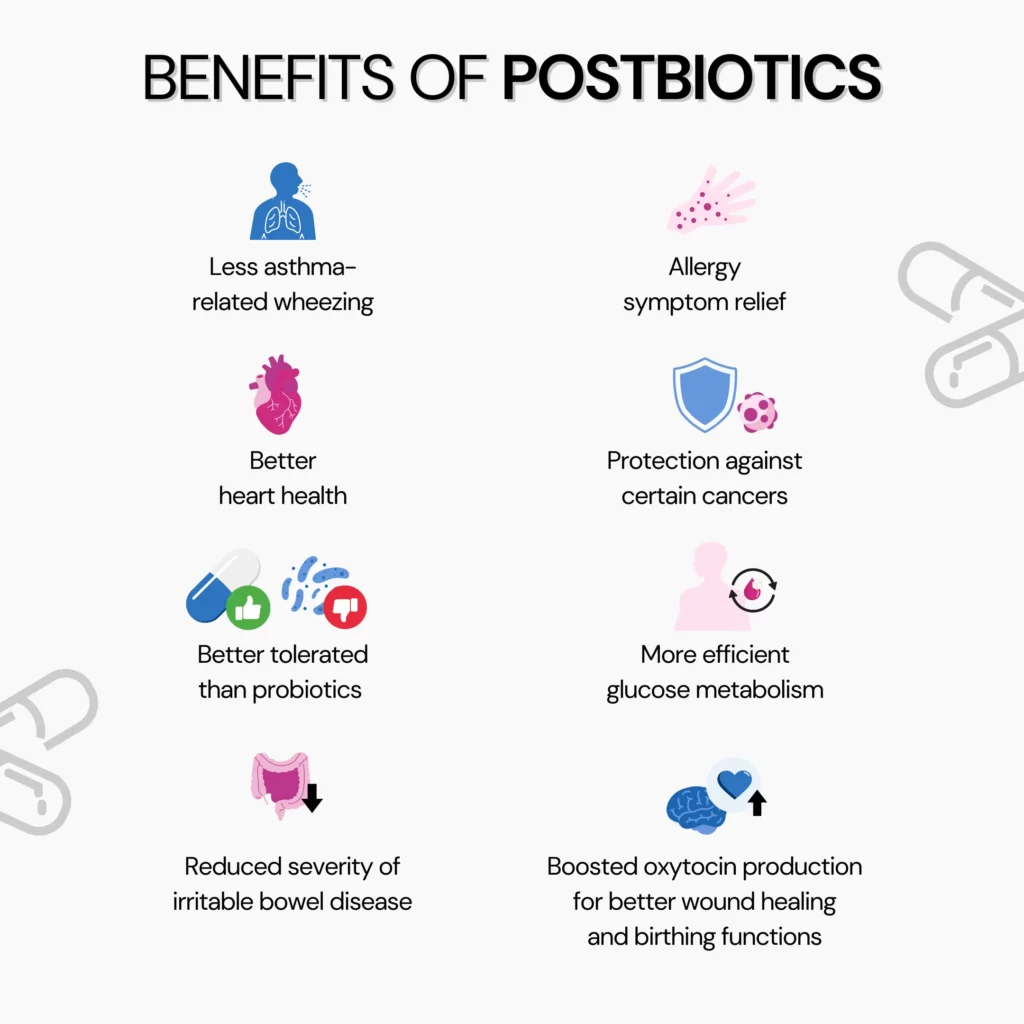Did you know you could rely on bacteria to improve your health? The numerous 'friendly' bacteria in our body support our gut health efficiently. Research has focused on probiotics and prebiotics to nurture this delicate gut microbiome balance. Now, a new promising player has emerged: postbiotics, also known as metabolites or cell-free supernatants. Read on to understand what they are, where they come from, and how they can support your health in ways you wouldn't expect.
Prebiotics vs. Probiotics vs. Postbiotics
- Prebiotics are nutrients, mainly fiber, that feed the good bacteria in your gut.
- Probiotics are the "good" bacteria that live inside your gut. They play an essential role in supporting your health by converting fiber into beneficial nutrients.
- Postbiotics are bioactive compounds produced by probiotic bacteria when they digest prebiotics (fiber).

What Are Postbiotics?
The International Scientific Association of Probiotics and Prebiotics (ISAPP) formally defined the concept of postbiotics in 2021.
According to the ISAPP, the term postbiotics refers to 'preparations of inanimate microorganisms and/or their components that confer health benefits on the host.'
Beneficial gut bacteria produce short-chain fatty acids, B vitamins, enzymes, and amino acids.
These substances are postbiotics and are important to overall health and wellness.
For instance, amino acids are the building blocks of protein, and vitamin B supports your brain health and immune function.
Thus, postbiotics are byproducts of probiotics that support your health.
What Are Some Common Postbiotics?
Here are some examples of postbiotics:
- Enzymes
- Cell wall fragments
- Metabolites such as vitamins, amino acids, and lactic acid
- Short-chain fatty acids
- Lipopolysaccharides and exopolysaccharides
Are Postbiotics Better Than Probiotics?
Since probiotics are live microorganisms, keeping them alive and stable is necessary but could be a challenge.
Also, the risk of infection increases since your body is dealing with live bacteria.
Postbiotics, on the other hand, are easier to formulate and store and have a longer shelf-life.
Postbiotics are usually well-tolerated.
You won't run the risk of developing an infection or allergy.
Can You Take Probiotics And Postbiotics Together?
You can take probiotics along with postbiotics for maximum health benefits.
Your gut bacteria's stability depends on age, diet, and environmental factors.
Taking them together will help maintain a balance in your gut microbiome.
How Do Postbiotics Work?
Scientists have yet to fully understand how postbiotics work.
However, butyric acid, a well-known postbiotic product, might help us understand it better.
Bacteria use butyric acid, a short-chain fatty acid, as fuel.
It can alter the levels of certain bacteria in your colon.
Your colon has the highest levels of bacteria compared to anywhere else in the body.
It's important to regulate them to support your immune system.
Scientists have found that you can manipulate bacterial presence in your colon by increasing butyric acid levels.
That's an example of the effects that postbiotics have on our gut.
What Are The Benefits Of Postbiotics?
Some research has shown that postbiotics can improve digestive health and support the immune system.
Some additional benefits of postbiotics include:
- Less asthma-related wheezing
- Allergy symptom relief
- Better heart health
- Protection against certain cancers
- More efficient glucose metabolism
- Boosted oxytocin production for better wound healing and birthing functions
- Better tolerated than probiotics
- Reduced severity of irritable bowel disease

Do Postbiotics Help You Lose Weight?
Despite limited research, some studies have shown that postbiotics might aid weight loss.
Postbiotics like short-chain fatty acids can suppress hunger signals, thus aiding in weight loss.
How To Naturally Boost Postbiotics?
You can naturally boost postbiotic levels in your body by eating probiotic and prebiotic-rich foods.
When your gut bacteria get more fiber to feed on, they naturally produce more postbiotics.
Some prebiotic-rich foods are oats, barley, chia seeds, flaxseeds, onions, and garlic.
Fermented foods like kimchi, yogurt, kefir, tempeh, miso, and sourdough bread also help boost gut bacteria.
The gut bacteria, in turn, increase postbiotics in the body.
Hand-picked Article For You: Difference Between Pre And Probiotics
Postbiotics Supplements: How They Work
Postbiotic supplements contain a concentrated dose of short-chain fatty acids, peptides, or enzymes.
They act as food for your gut bacteria and help them thrive.
They can also influence your immune system, regulate inflammatory response, and boost overall immunity.
Who Needs Postbiotics Supplements?
Taking postbiotic supplements could be beneficial if you're targeting specific health concerns.
Supplements are a simple and reliable way to ensure you get your required dose.
Always consult your doctor before starting any supplements.
Potential Downsides Of Postbiotics
Most postbiotic supplements are safe.
However, you should still be careful and regularly consult your healthcare provider.
Research around postbiotic supplements is still in the initial stages.
Thus, when buying a supplement, ensure they are from a reputable brand and the health claims are backed by research.
You might be at a risk of developing an adverse reaction to a postbiotic supplement if:
- You have recently undergone surgery
- You have structural heart disorders
- You have digestive tract disorders
- You are pregnant
Summary
- Postbiotics are bioactive compounds produced by probiotic microorganisms when they feed on prebiotics.
- Preliminary research shows that postbiotics can have many health benefits, including supporting the immune system.
- You can naturally boost your body's postbiotic production by increasing your food's fiber content.
- Fermented foods are also highly beneficial for gut bacteria and help increase postbiotic production in the body.
- Many people might better tolerate postbiotic supplements, which also have lesser chances of causing bacterial infections.
- It's not necessarily safe to take postbiotic supplements if you have some underlying disorders. Consult your doctor before beginning a regimen.
References
https://www.ncbi.nlm.nih.gov/pmc/articles/PMC9027423
https://www.nature.com/articles/s41575-021-00440-6
https://www.nature.com/articles/d42473-020-00552-8





